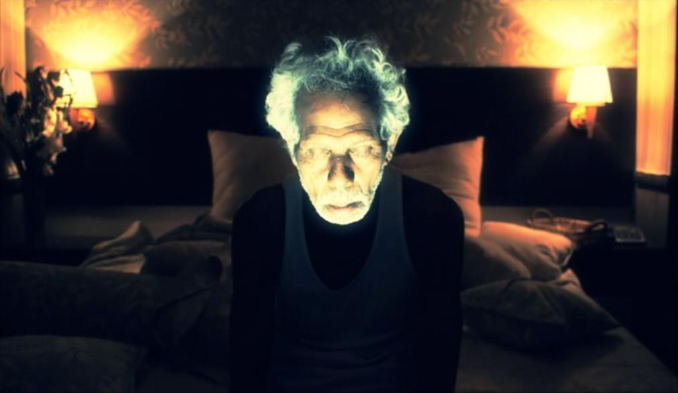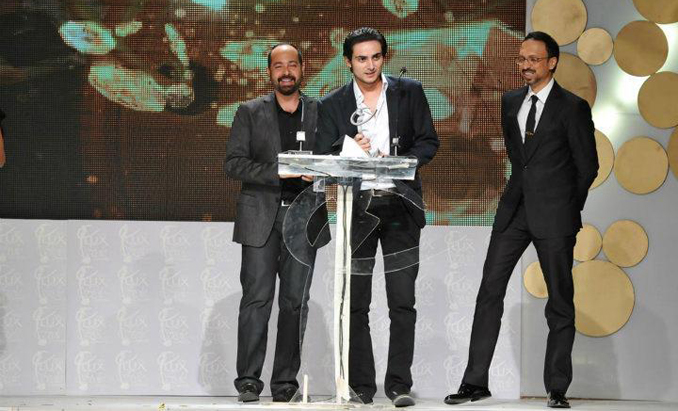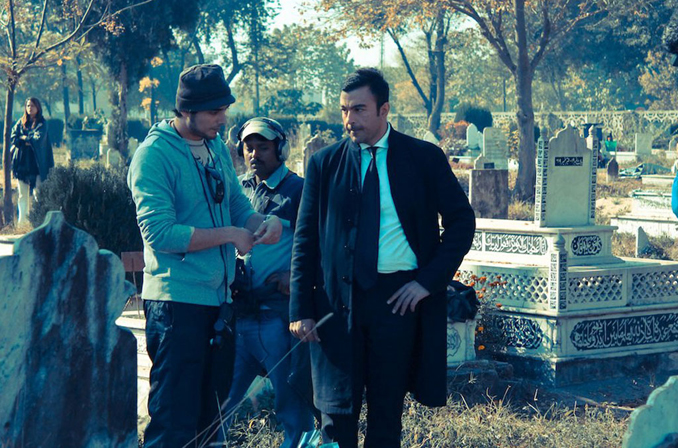Written by: Syed Abbas Hussain
Posted on: October 14, 2013 |  | 中文
| 中文
Bilal Lashari (left) at work
Pakistan is witnessing a very exciting time for cinema, what with the new breed of filmmakers revitalizing the film-industry with fresh ideas and state-of-the-art technology. Bilal Lashari is a name that is synonymous with quality. His music videos have raised the bar in terms of creativity and immaculate presentation. ‘Sajni’ and ‘Chal bulleya’ left many in awe. His upcoming project for the big screen is perhaps the most highly anticipated film in the country. Youlin speaks to the dynamic, young filmmaker about his directorial journey and the release of his much hyped film ‘Waar.’
You started your career by directing music videos. How did you get your first break?
I was back in Pakistan for my summer vacations from film-school when I met Atif Aslam, who was working with my close friends Mehmood and Samir on his first album. Atif and I had a casual conversation about doing a video together. This finally led to me shooting the music video for his song Hungami Halaat.
Your work has a distinct avant-garde style which sets you apart from the rest. This abstract form, as seen in videos such as Sajni with the music band Jal or Chal Bulleya with the Meekal Hasan Band, has given a new dimension to the way Pakistani videos are produced. Who has been your inspiration in the world of filmmaking?
I can’t say that there is anyone specific since I can think of so many names. Usually the inspiration for a music video really comes from the song in terms of its concept. In Pakistan, it is sometimes important to have a strong or distinct concept for it to stand out. The production value isn’t generally very big so you have to compensate by being very creative. That is the great thing about music videos: it is a happy medium between doing art and being commercial, and you get to do both.
 |
| Still from Chal Bulleya |
So do you feel that in Pakistan you have that creative leeway only in music videos as opposed to having it in film or television? Do you feel that you get creatively restricted at times in the other mediums owing to the demands of commercialism?
You can be restricted, but it is more a question of whether you start right away or you want to establish yourself as a filmmaker in the industry as well as experiment. That is where music videos are a good way to learn and get your name out there. They are quick and short and you can make different styles of videos. That makes music video direction a good medium as far as filmmaking is concerned.
What kind of response did you receive from the general public regarding your off-beat videos?
Generally the response has been fantastic. I don’t think anyone has been confused so far. I think I try to keep it as straight forward as I can without being too crazy. At the end of the day it is just not your video. You are making the video for a musician or a band and you have got to listen to them and give them what they need.
When it comes to shooting a music video how much of an input emanates from the musician whose video is being worked on? Have you ever reached a deadlock or a disagreement with a musician regarding a concept?
It really depends on which artist you are dealing with. There are different temperaments you get to deal with as far as ‘stars’ are concerned. I have been very lucky with my concepts so far. I have not had much interference. Obviously artists want to collaborate but they tend to get nervous about their image and how they will look and they approach the video from that point of view generally. But once they are comfortable around you and they know that they can trust your work, they usually end up taking the backseat.
 |
| Accepting the award for Best Music Video Director at Lux Style Awards |
The TV drama industry has become a force to be reckoned with in Pakistan. Directors who make it big get work constantly and make good money in the process. Has the thought of venturing into that medium ever crossed your mind? In your view, does it make for a more stable profession for a filmmaker as opposed to just remaining within the confines of cinema?
If I was looking for a stable income I would’ve continued my degree at LUMS (Lahore University of Management Sciences) and not gone off to film school. Money is not exactly what drives me. Plus I am not too sure about how stable directing television is. I guess it depends on the kind of stuff you’re doing. Cinema is a different ballgame altogether. The investments are far greater and the stakes are much higher. The demands of the audience are higher because they are paying to watch you and giving you time. But yes, television would be a more secure work place.
While our television drama goes from strength to strength, cinema has been left to fester as a dilapidated industry. In what ways has Pakistan’s film industry faltered?
There are lots of theories and people have various reasons to explain that. I personally think it has got to do with the kind of people who were involved in both the industries. Cinema is a very different ballgame and has different dynamics. The source of funding for cinema was coming from a very narrow area and hence the same substandard material was being recycled. Those involved in the medium of film weren’t keeping up with new technology and equipment. The quality thus really suffered. Traditionally there has been more prestige attached with working on television, and even for women it is easier to come on television, I feel. Pakistani cinema has really seen a decline intellectually and aesthetically. The political situation over the past decades had an impact on cinema and it was left in the hands of a few people who were just looking for a quick buck. They took the art out of cinema and reduced it to only being a business, whereas it can be both at the same time. But the good thing is that things are changing again because whatever the arts go through, is in stages. Now a lot of people are coming in this line of work. I remember when I was starting out there weren’t many film schools. It is incredible how people who have recently entered the industry are taking this line of work so seriously. I think that in the next few years there will be a lot of independent cinema coming out of Pakistan. Films will not just get noticed in Pakistan but also internationally, because people abroad are receptive to stories coming out of this part of the world.
Would we ever see your work on TV?
I keep on thinking of doing a TV show along the lines of stuff that comes out of HBO, rather than the local material as it is right now which I find visually limited and uninspiring. I would like to try something more long the lines of American TV and maybe bring that to Pakistani television.
How will that be received by Pakistani audiences though?
I think if it is a good quality product, people will like it. It would be received in the same way as my experimental videos were, which were watched and appreciated. We like to say that we have a certain kind of audience that prefers one style of television or film. That still does not mean that they won’t accept any other style. My mom, for instance, loves the current crop of Pakistani dramas but that does not mean that she won’t enjoy an action flick once in a while. If it’s something that hooks people, they will watch it regardless of it not being their primary preference.
When it comes to cinema, Pakistani filmmakers feel that allowing the screening of foreign films in Pakistan, especially Indian ones, has hindered the progress of local cinema. Do you think limiting competition is a curative measure to deal with a dwindling cinema industry?
I think this is a very convenient excuse, for some filmmakers to blame Indian films for our own films not doing well. I think they should be around; we need to detox our industry of some local films. Before Indian films started showing in cinemas, cinemas were almost dead. I do agree that we have a small market for films here but the good thing is that films are going international and there is a huge overseas market for foreign films. Right now the world is looking at Pakistan and they are more receptive to what comes out of here, so it is a good time to make films which appeal to foreign audiences well. That is going to help us in having a bigger market. We can compete with Indian films, not necessarily in terms of production values but in the way we choose to tell our stories.
 |
| Behind the scenes of Waar |
There are many successful filmmakers who are self taught and have honed themselves with the requisite skills while working in the field. Having undergone the rigorous training of a film school, how important according to you is attending a film school for a prospective director?
For me as a filmmaker going to film school isn’t just important for academic learning. It is more about living on your own in another country, discovering yourself, making your own choices and working on your talent. Those are the things that end up inspiring you, and they help you as a filmmaker more than the classroom. But at the same time, attending a film-school is a great way to network and make connections. I made some great friends in film-school who still help me out now and then when I'm stuck with a project and vice versa. You make certain life-long relationships and also get a lot of exposure. You have a lot of young students from all over the world, so if you have an assignment, let’s say, everyone is going to have their own way of interpreting it. You get exposed to a variety of approaches and treatments. It is not a necessity though, as in the age of the internet you have access to so much information; hence you can really do without it and save the money and time and make a film instead *laughs.*
Ok, now let’s come to the much talked directorial venture of yours, Waar. The trailers boast some glossy visuals. How did this project come about?
This project was originally conceived by Dr. Hassan, who is The CEO of ‘Mindworks’ in Islamabad. It was initially a smaller project, maybe even a telefilm. The two of us got along well when we first met and we started bouncing ideas to each other. The project evolved over time into a bigger film. It has been two years since its inception.
What is the music going to be like; will it have lip synced songs, as per the tradition of our mainstream cinema?
It has a couple of dances in the rain….just kidding! There are going to be no item songs, nor the kind of stuff that is generally seen in Pakistani films.
How was your experience as a debutant film director and what were some of the challenges that you had to face?
My experience has been a lot of everything, actually. There are some great memories, from the shoots and I made some life-long friends in the process. We went through lots and lots of issues; every production has its own set of issues and problems, after all, and we had our fair share as well. That is, of course, a part and parcel of making a movie. Overall, it has been priceless though.
Do you work on multiple projects at a time?
No, I hate cheating on my work! That is something I can’t do. Once I get into a project I am consumed by it till it’s done.
At your young age you have had to direct some very well established actors. Was it ever intimidating to direct senior actors like Shaan who have been in the industry for donkey’s years?
I knew most of the actors before the shoot so it was really comfortable and casual at a certain level.
Do you feel that actors, owing to little experimentation in television and cinema, and having done more or less the same genre of roles and scripts for a long time, ever get set in their ways? Would you then make them unlearn some of the stuff to get the exact nuances that you are looking for?
I think I had that problem with the secondary cast and the extras because people who aren’t very experienced can sometimes have a set way of what they think acting is. The more experienced cast members have the experience to be versatile and that’s one thing I realized - that they are not too set in their ways. But in instances that they are, it is regarding aspects that define them. Plus, if they are stars, they do have a certain say in the project.
Filmmaking isn’t exactly considered a very mainstream profession in Pakistan. When you started your degree in filmmaking, the media was still in its teething stages. Was there any trepidation on the part of your parents or even you, regarding your chosen career path?
I was actually in LUMS for a year. At the beginning of my sophomore year I was absolutely convinced that I wanted to be a filmmaker. Then it was a matter of convincing my parents, which was initially difficult, but I don’t blame them for that. My parents wanted me to keep it as a hobby but they eventually realized how serious I was about filmmaking. They have been really, really supportive since then.
Though the country’s film industry has presented a bleak picture for many years, there seems to be ray of hope with quality releases coming in dribs and drabs such as Bol, Khuda Ke Liye and the recent award winning film Seedlings. Would you go as far as to say that a revival is in the pipeline?
I would call it rebirth rather than revival. I think the typical Lollywood films should not be revived, I personally find them distasteful. We have a new breed of filmmakers with fresh ideas and with a fresh perspective in making new films and it is really going to create a new industry with a new identity. Hopefully one that people would want to get associated with and involved in.
You may also like: